
The Politics of Sea Surgery During the GAoP Menu: 1 2 3 4 5 6 7 8 9 Next>>
The Politics of Sea Surgery During the Golden Age of Piracy, Page 8
Micro-Politics: Surgeon as Warrant Officer
On naval vessels, a surgeon was a warrant officer, a rank given to those with specialized skills. His office was by warrant rather than by commission. Warrant officers were the highest non-commissioned ranks, having a Queen's or King's document (the warrant) which is signed by the Secretary of Defence. John Keevil gives an example of a warrant issued to George Bragg of the HMS Blandford:
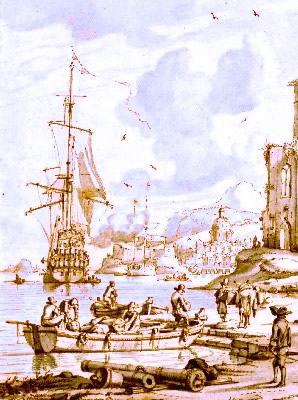
Artist: Abraham Storck
Preparing a Ship in Port to Leave (1674)
It began, ‘By the Principal Officers and Commissioners of His Majesty’s Navy. Whereas by a Certificate from the Master or Governours of the Mystery and Commonality of Barbers and Chururgeons of London [the Barber Surgeon's Company], bearing Date the 9th of October 1711. We are informed of your ability and fitness, to serve as Master Chyrurgeon of any of His Majesty’s Ships of the Fourth Rate’, the words in italics being entered in ink on the printed form. The warrant then continued with the requirement that Spragg should fit himself out with ‘Instruments, Medicaments, and other Things proper’; he was to join his ship and ‘take Charge of Her as Master Chyrurgeon’ during her intended voyage. He was to keep two journals and deliver one to the Physician at Greenwich Hospital and the other to the Company at the end of the Voyage. He was to produce to the Treasurer of the Navy a certificate thereof. When his ship was paid off, the surgeon must have ready for the Comptroller’s Clerk in attendance a list (signed) of all seamen with wounds or hurts entitling them to relief from the Chatham Chest by smart money or pensions, noting who had had certificates and who had not.1
Keevil also discussed another type of warrant, one issued to a surgeon's mate in 1705. This "directs him to go aboard in this capacity [surgeon] and obey his commanding officer, his superiors and the surgeon. It contains no reference to keeping a journal or other records."2
Warrant officers, while usually necessary to some facet of the ship, were not always highly esteemed by seamen. Being warrant officers, surgeons were of Wardroom rank.3 This means they were entitled to eat in the mess room of the commissioned officers. However, they were "classed as a civilian craftsman like the purser or chaplain", not being allowed on the quarterdeck because that privilege was only extended to commissioned officers.4 Historian Zachary Friedenburg observes that since the surgeon was not a commissioned officer, he "rarely succeeded in having his protests reach the captain."5 Kathleen Harland notes that most sea surgeons, being "far less familiar with naval conditions, could find their opinions challenged by others who had ‘seen it all before.'"6
1 John J. Keevil, Medicine and the Navy 1200-1900: Volume II – 1640-1714, 1958, p. 259-60; 2 Keevil, p. 260; 3 Zachary B. Friedenberg, Medicine Under Sail, 2002, p. 35; 4 Friedenberg, p. 6; 5 Jonathan Charles Goddard, "An insight into the life of Royal Naval surgeons during the Napoleonic War, Part I," Journal of the Royal Naval Medical Service, Winter 1991, p. 206; \6 Dr. Kathleen Harland, "Naval Medical Care 1620-1770 Saving the Seamen: Naval medical care in the Pre-Nelson era, 1620-1770," J Royal Medical Service 2005, p. 66;
Micro-Politics: The Men's Opinion of the Surgeon
Sailors typically preferred to sail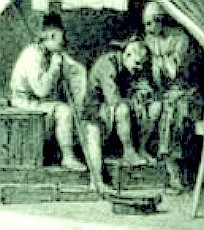
Artist: Auguste Raffet (1839) on a vessel that had a sea surgeon, whatever his official status within the naval ranks. Surgeons were "recognised as desireable for the reassurance of the crew but also essential to maintain their numbers and fitness."1 Men sometimes even refused to sail on a ship that didn't have a surgeon.2 Writing at the beginning of the 17th century, English Admiral Sir William Monson recommended, "The surgeon is to be placed in the hold, where he should be in no danger of shot; for there cannot be a greater disheartening of the company than in his miscarrying, whereby they will be deprived of all help for hurt and wounded men."3
Perhaps the most graphic account of the importance of a surgeon from the men's point of view from this era comes from privateer William Dampier, whose colorful accounts of his voyage around the world contain many insights into life on a privateering voyage. In 1687, during an extended stop in Mindanao, the men decided to mutiny against their captain. The mutineers "bound themselves by Oath to turn Captain Swan out, and to conceal this Design from those that were ashore, until the Ship was under Sail; which would have been presently,

Artist: Thomas Murray - William Dampier (1678-9)
if the surgeon and his Mate had been aboard; but they were both ashore, and they thought it no Prudence to go to Sea, without a Surgeon". It was so important to them to get the surgeon aboard that they sent word that a man on the ship had "broke his leg by falling in the Hold." The ship's surgeon didn't want to leave, so he sent surgeon's mate Herman Coppinger in his place. Dampier tells us that "I went aboard with him, neither of us distrusted what was designing by those aboard, till we came thither. then we found it was only a Trick to get the Surgeon off [the land and onto the ship]".4
Further proof of their value for their ship's surgeon occurred in 1688, when Dampier, Coppinger, Robert Hall and 'and one named Ambrose' requested to leave the crew. The "Crew would not part with the Surgeon." So Coppinger jumped into the boat with the other three men and grabbed Dampier's gun, swearing "he would go ashore, and that if any Man did oppose it, he would shoot him; but John Oliver, who was then Quartermaster, leapt into the Canoa, taking hold of him, took away the Gun, and with the Help of two or three more, they dragged him again into the Ship."5 There can be no doubt of the opinion in which those men held their surgeon.
1 Jessie Dobson & Robert Milnes Walker, Barbers and Barber-Surgeons of London, p. 47; 2 For examples, see John Keevil, Medicine and Navy, Vol. 1, 1957, p. 141 & 179, 3 Sir William Monson, Monson’s Naval Tracts, Vol. IV, M. Oppenheim ed., p. 57-8; 4 William Dampier, A New Voyage Round the World, 1699, p. 376; 5 Dampier, p. 483
Micro-Politics: The Captain's Opinion of the Surgeon
As important as the men's opinion of the surgeon was in the Navy, it was no where near as important as the captain's. When the a ship left port, the views of the Company of Barber Surgeons, the apothecaries and physicians and even the Navy ceased to have much influence over the surgeon. As historian John Keevil puts it, once the surgeon had passed his entrance exam at surgeon's hall, "the surgeon became largely dependent on his captain’s good opinion of him."1 If he was to be promoted to a ship of a higher rank, he had to have his captain's blessing.2 Failing to impress his captain could result in the surgeon becoming a pariah. As Keevil explains,
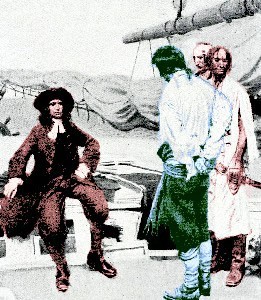
Artist: Howard Pyle (1901)
Then, as now, a surgeons loss of a captain’s confidence could quickly lead to complete undermining of such slender professional authority as he might until then have commanded. The effect of this was that patients would not report to him. As the naval surgeon, Patrick Campbell noted: ‘many fear the Boatswain’s Crew who will often debate the case with Mr. Doctor, whether such or such men be not in a condition to watch. Especially when the Surgeon is not in favour with the Commander.’3
Captains could even overrule surgeons when they didn't agree with their assessments. During the epidemics that swept through the Fleet, it was sometimes recognized that conditions on the ship could be the source of the health problem. If this happened, the captain took responsibility for the illness, often with no regard for the opinion of the surgeon.
If the surgeon noted the outbreak of cases of scurvy and requested a stopover on an island to gather fresh food supplies, or if the anchorage was in an unhealthy part of the harbor and a change of anchorage indicated, he could be overruled by the captain. He could recommend against the transfer of men from a diseased ship or accepting impressed replacements, but his requests were usually ignored until far too late.4
Merchant Captain Nathaniel Uring gives another example of the captain usurping the surgeon's responsibilities. While at the island of Carmen in Mexico, Uring's ship was ravaged by deadly fever, causing him to question the ship's surgeon's ability.
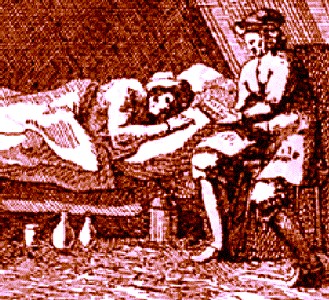
Artist: Hans Friedrich Fleming -
The Perfect Soldier Teutsche (1726)
Uring believed the surgeon had been over-bleeding the feverish patients, continuing "to do so ‘till they had lost all their Spirits, and then they expired. When I found this ill Practice, I would not suffer him to administer any Physick, or do anything to the Patient till I had first seen him"5. The first day the illness was noticed, Uring told the surgeon to give feverish patients an emetic or medicine to cause vomiting. The next day, he was to bleed the patient and gave them as much barley water or water gruel as they wanted. "[B]y keeping to this Method no more of my People died, though but two Men besides my self escaped the Distemper."6
The captain's opinion of the surgeon even affected him after the voyage was completed. Edward Barlow noted that on a merchant voyage that "some of the owners were so base, namely, one Captain Heath and Sir Henry Johnson, that they would not pay the ship’s [the Septer] doctor" in 1698.7
The captain's opinion could even affect the surgeon's future employment. Upon returning to England, a naval surgeon had to be hired for his next voyage by applying through the Barber Surgeon's Company. Here, a testimony from his previous ship's captain could be an important part of getting another berth. The Company of Barber Surgeon's records of 17th century minutes contain the following note: "This Court upon Captaine Benjamin Cranleye's Letters of recommendation doth order that Thomas Evans be imployed to Sea in the next Expedition."8
Naval physicians also had to remain in the captain's good graces, despite their more respected social standing. When physician William Oliver was treating Sir Andrew Leake for a fever in 1693, 
he "ordered his patient ‘some Cordials now and then of our Cordial Waters aboard’". Cordials were sweetened alcoholic concoctions such aqua liminorium (lemon water), aqua melissæ (lemon balm water), aqua menthæ (mint water), aqua odifera (sweet water) and even spiritus vini (brandy) as well as several others. However, Leake "soon took that Aversion to [the cordials], that he abhorr’d the very smell of them and assur’d me he would Die rather than take them". So Oliver switched to a concoction made from ship's beer combined with "some of his own Margate Ale, which he lov’d mightily, and drank with a great deal of Pleasure to the end of his Fever, and did well."9
The material presented so far in this section paints the relationship between the captain and the ship's surgeon in the Navy as a somewhat adversarial one. However, provided the surgeon was deemed competent, the captain would leave all surgical work and decisions to the ship's surgeon. "It was, of course, necessary for them [captains] to have some knowledge of first aid, but in general they had small regard for their surgeon's mysterious and circumscribed occupation."10 In fact, it was sometimes great regard. Richard Hawkins, whose ship the Dantie had been surrendered to the Spaniards in 1594, wrote that "God so blessed the hands of our Surgions (besides that they were expert in their Art) that of all our wounded men not one died, that was alieve the day after our surrendry, and many of them with eight, ten, or twelve wounds, and some with more."\11
One possible factor motivating a captain to recognize the skills of a a surgeon was because when there was no surgeon,
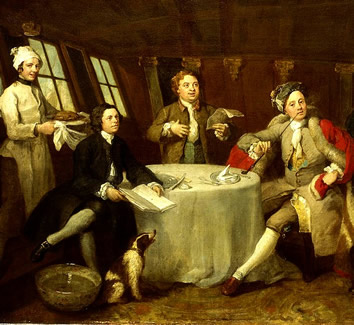
Artist: William Hogarth - Captain George Graham in his Cabin (c. 1746 )
the surgical duties on the ship fell to the captain or another officer. Historian Zachary Friedman says that on ships with no surgeon the captain would have to use a surgical book and whatever unfamiliar medical instruments and medicines he had been given.12 This would be a very slow and painstaking way to treat wounded men.
Perhaps the most graphic account we have of a captain serving as surgeon comes from Nathaniel Uring's book. When Uring was First Mate on a ship the surgeon died off Angola in 1701. As a result, "the Care of the Sick and Lame fell to my Share."13 Unfortunately, Uring doesn't report on anything he did in his capacity as surgeon on that voyage, so we will never know how he fared.
Silas Told reports on the actions of a captain and boatswain acting as surgeon during an "fever and ague" he contracted while following a hurricane 1727. The captain, David Jones, put Told in his cabin. Then he
began to explore his surgery-box, in order to touch my case with some proper medicines, if any were on board; but, to his disappointment, they were all expended. Notwithstanding this, he sent for the boatswain into the cabin, and asked him, if he knew of any remedy for the intermitting fever [almost certainly malaria]. He told the captain that he could not only produce a remedy, but that if I lived fifty years longer in the world, I should not be subject to it thereafter14
1 John J. Keevil, Medicine and the Navy 1200-1900: Volume II – 1640-1714, 1958, p. 100; 2 Keevil, Vol II, p. 261; 3 Keevil, Vol II, p. 230-1; 4 Zachary B. Friedenberg, Medicine Under Sail, 2002, p. 35; 5,6 Nathaniel Uring, A history of the voyages and travels of Capt. Nathaniel Uring, 1928, p. 168; 7 Edward Barlow, Barlow’s Journal of his Life at Sea in King’s Ships, East and West Indiamen & Other Merchantman From 1659 to 1703, p. 501; 8 Keevil, Vol 1, p. 228; 9 Keevil, Vol II, p. 231; 10 John Keevil, Medicine and Navy, Vol. 1, 1957, p. 118; 11 Keevil, Vol. 1, p. 104; 12 Friedenberg, p.25; 13 Uring, p. 47; 14 Silas Told, An Account of the Life, and Dealings of God with Silas Told &c., 1786, p. 18

